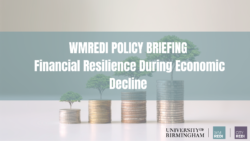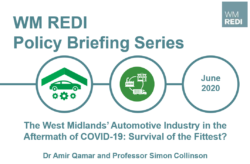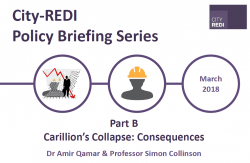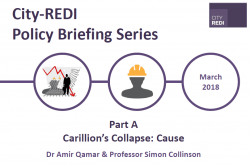In this policy briefing, Dr Amir Qamar, Dr Emma Gardner, Professor Anne Green and Professor Simon Collinson review the financial health of the largest 50 manufacturing firms within the West Midlands. Introduction The ongoing impact of the UK’s departure from the EU, the aftermath of the pandemic, and the recent depreciation of the pound provide … Continue reading “WMREDI Policy Briefing: Financial Resilience During Economic Decline”
Author: Amir Qamar
Conducting Qualitative Research During Times of Uncertainty
Dr Amir Qamar looks at the influence lockdown has had on qualitative research, and discusses the pros and cons of conducting research online. The following piece is taken from the latest Academy of International Business (AIB) Research Methods Shared Interest Group (RM SIG) newsletter, which can be found here. There are approximately 6.3 million Covid-19 … Continue reading “Conducting Qualitative Research During Times of Uncertainty”
Policy Briefing: The West Midlands’ Automotive Industry in the Aftermath of COVID-19: Survival of the Fittest?
In this Policy Briefing, Dr Amir Qamar and Professor Simon Collinson explore the financial position of the 50 largest (in terms of revenue) automotive firms in the West Midlands and examine how resilient they are to the economic shock caused by COVID-19. Research by Oxford Economics identifies Birmingham to be hit exceptionally hard by the … Continue reading “Policy Briefing: The West Midlands’ Automotive Industry in the Aftermath of COVID-19: Survival of the Fittest?”
The Retail Crisis Catches Up with Debenhams
Debenhams was reportedly worth £900 million in 2016, but today the retail giant is only worth £20 million. Debenhams generates approximately 80% of its revenue in the UK, thus the firm is highly dependent on a single country. Considering that the British retail industry has been experiencing somewhat of a crisis, with firms including M&S, … Continue reading “The Retail Crisis Catches Up with Debenhams”
The 2018 Retail Crisis Catches Up With Marks and Spencer
Recently, the UK retail industry has been facing six challenges, namely: 1) a squeeze in incomes; 2) the shift to online shopping; 3) changing tastes; 4) rising overheads; 5) high debt; and 6) simply too many shops. Following the closure of Toys R Us, Maplin and certain New Look stores, approximately 5,500 people are already … Continue reading “The 2018 Retail Crisis Catches Up With Marks and Spencer”
Flexibility Differences between Lean and Agile Production in the West Midlands Automotive Supply Chain
The majority of studies which have investigated lean and agile production have explored each of these production concepts in silos, which is a growing trend in the recent literature. Given that a number of studies assert that flexibility is an essential factor for differentiating lean and agile production there is an important need to explore … Continue reading “Flexibility Differences between Lean and Agile Production in the West Midlands Automotive Supply Chain”
The 45th Academy of International Business Conference – Birmingham Business School
On the 12th – 14th April 2018, the Birmingham Business School successfully hosted the 45th Academy of International Business Annual (AIB UK&I) Conference. As the contemporary world is currently experiencing pivotal forces of change, particularly related to uncertain and turbulent political environments, the theme of the conference was to explore international business strategies in a changing … Continue reading “The 45th Academy of International Business Conference – Birmingham Business School”
Part B: The Consequences of Carillion’s Collapse
Carillion, the second-largest construction firm in the UK, were proud of their commitment to support regional growth and small-scale suppliers. As part of this commitment, they directed 60% of project expenditure to local economies. Following the collapse of the firm, this positive multiplier effect became a significant, negative multiplier effect, particularly damaging to small-scale suppliers … Continue reading “Part B: The Consequences of Carillion’s Collapse”
Part A: The Causes of Carillion’s Collapse
Racing to secure bids over rival construction companies, Carillion, the second-largest construction firm in the UK, hit a financial tipping point, lost the backing of the banks and collapsed. Its aggressive growth strategy and the diversification of its business portfolio increased the complexity of its internal structure. Coupled with poor oversight of its day-to-day operations, … Continue reading “Part A: The Causes of Carillion’s Collapse”
UK Automotive Supply Chains Are Not Lean!
With its origins traceable to the Japanese Toyota Production System and the publication of one of the best-selling books amongst both academics and practitioners, ‘The Machine that Changed the World’, the concept of lean production has received substantial attention and has become well embedded within automotive studies in Operations Management (OM) and Supply Chain Management … Continue reading “UK Automotive Supply Chains Are Not Lean!”










